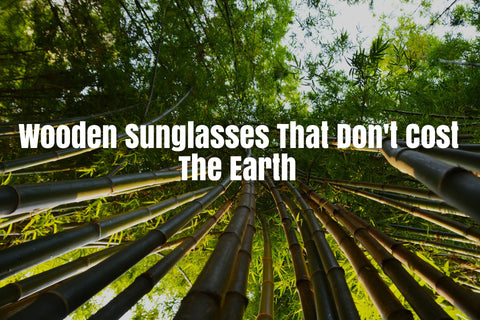Wooden sunglasses continue to rise in popularity and are no longer a fringe fashion item for ‘hipsters’ and ‘eco-warriors’.
Here are six reasons you need wooden sunglasses and why they’re here to stay.
WOODEN SUNGLASSES ARE GOOD FOR OUR PLANET
Recently the world has woken up to the glut of humanity and we’re beginning to ask, “how can I do my bit?”. We currently lose forests at a rate of 18.7 million acres per year or the equivalent of 27 soccer fields every minute! Forests are essential to our survival. They purify our air, filter our water, prevent erosion and combat climate change. Sourcing sunglasses or any wooden products through responsible forestry practices ensures the future of our forests. The Forest Stewardship Council is an independent certification body. Accreditation means forest management has complied with the Council’s 10 principles of Responsible Forestry Management. By sourcing sunglasses or any wooden products from renewable forests, poor practice can be radically reduced.
The hand manufacturing of wooden sunglasses also emits negligible greenhouse gas emissions compared to that of plastic, metal or alloy frames. Greenhouse gas emissions are responsible for air pollution, atmospheric warming, disastrous weather events and a rise in sea levels. Bamboo sunglasses are especially beneficial as bamboo grows so fast and produces 35% more oxygen than a similar stand of trees.
Alongside the green beginning of wooden sunglasses is their green end. Plastic sunnies clog up landfills for 450 years compared to 13 years for wooden sunnies!

WOODEN SUNGLASSES ARE GOOD FOR YOU!
Wooden sunglasses are non-toxic and allergy free. Those with plastic allergies will have to pay out for expensive metal or alloy alternatives but hypo-allergenic wooden frames are now the beautiful solution. Far nicer to have natural wood grain next to your skin compared to compressed petroleum! The most widespread protection from sunglasses is against ultraviolet (UV) rays. Minimum classification for sunglasses is 380 nanometres (or 95% of rays). Sunglasses which claim ‘UV 400’ filter out 99% or more of UVA and UVB light with wavelengths up to 400 nanometres. Wide spread exposure to UV rays leads to arc eye, snow blindness, cataracts, conjunctiva and some forms of eye cancer.
Dark lenses with little or no UV protection are more harmful to the wearer than no sunglasses at all! They cause the pupil to open wider and let in more harmful UV rays. It is important to understand the protection offered by sunglass manufacturers.
WOODEN SUNGLASSES ARE COMPLETELY UNIQUE
Various types of wood are used to make wooden sunglasses. Some include ebony, bamboo, rosewood, walnut, white maple, zebrawood and mahogany. Different colours are from different woods or different parts of a tree. As a tree grows, the center hardens, sometimes decaying, and forms ‘heartwood’. The living outer layer is called ‘sapwood’. Both these regions form different hues, veins and rings. Knots are formed when parts of the tree die yet the tree continues to grow around the dead portion. Every pair of wooden sunglasses is totally unique as no two trees are the same. Darker frames are from darker woods rather than harmful stains or dyes. Likewise, lighter frames or red hues are from different wood species.
It can be fun learning about the different types of wood and which region of the tree it comes from. In terms of a fashion piece, there is no other item where one will be completely different.
WOODEN SUNGLASSES ARE MOST FREQUENTLY CONSTRUCTED BY HAND
The construction of a wooden frame involves laser-cutting from planks of wood. Once cut and ground to a uniform size, a buffing wheel is used to sand and buff every piece separately before they are assembled. Wooden sunglasses can be solid wood or laminated. Laser cut-outs of wood are glued together by hand, layer on layer, to produce wooden frames. This layering of wooden pieces is called ‘laminating’ and layers are placed with the grain running in alternate directions to create strength. Laminated wood frames allow for slimmer design and multiple hues compared to solid wood frames.
It is more labor intensive to create sunglasses with wooden arms AND frames, than wooden arms alone. Think of a plank of timber...multiple wooden arms can be cut from the same plank compared to the frames where only one may be cut. The time-consuming hand construction of wooden sunglasses makes every pair a work of art and perhaps more special.
WOODEN SUNGLASSES TAKE SOME LOVING
Owning a pair of wooden sunglasses takes a little more time and love. Wood is a living medium which will dry out and change hues over time. Leaving them on a dashboard of a car for example, isn’t the best idea. Butchers block oil, beeswax or lemon juice mixed with olive oil rejuvenate a pair of sunnies restoring the moisture content that makes them so beautiful. Begin by rubbing a little oil or wax onto the wood, when it starts to shine, remove excess using a dry microfibre cloth. Repeat every so often depending on how frequently the sunnies are being used. Wood is far less pliable than plastic and frames are that bit more delicate. It is important to store wooden sunglasses in a protective case to avoid damage by keys, phones or vigorous hugging by another party!
WOODEN SUNGLASSES ARE LIGHTWEIGHT
While popular opinion would have you believing wooden frames are heavy, wood is in fact generally less dense than plastic, so frames are lighter than plastic alternatives! Wooden sunglasses made exclusively from bamboo will even float.
With six reasons to get yourself some wooden sunglasses, it seems this glowing addition to summer is firmly here to stay!
LIKE us on Facebook: https://www.facebook.com/viloeyewear
Keep up with us on Instagram: Instagram
WATCH us on YouTube: YouTube.com/Vilo




